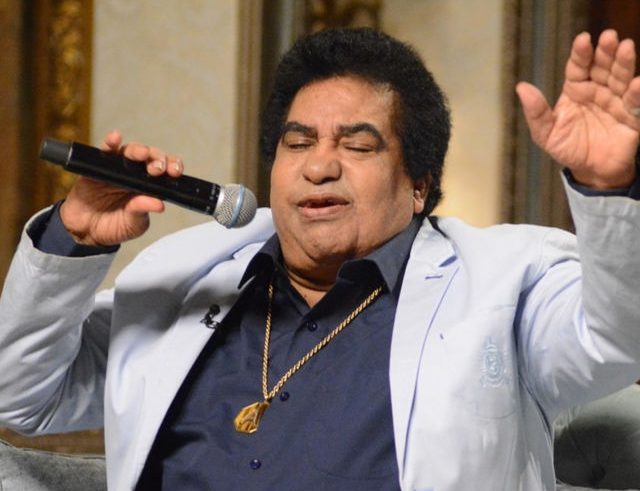Shaabi music has always been a mirror of Egypt’s streets, its frustrations, its joy. From cassette tapes passed between microbuses to trap beats on Spotify, the genre has shapeshifted across decades. It’s not about sounding polished—it’s about staying real.
Before the Beat: Sheikh Imam & Ahmed Fouad Negm
Before cassette kiosks and viral remixes, Shaabi’s spiritual predecessor lived in smoky downtown cafés. In the 1950s and 1960s, Sheikh Imam and Ahmed Fouad Negm forged a sound that was as radical as it was raw.
Sheikh Imam, nicknamed “the People’s Singer,” was born in 1918 in a humble Giza village and lost his sight early in life.
Negm, equally grounded in his rural roots, was orphaned young and spent his early years in a charitable orphanage. When the two met in 1962, something clicked: Negm’s sharp colloquial poetry found its echo in Imam’s oud and raspy voice.
That duo gave birth to songs like “Ana Atoub an Hobbak” and “Guevara Mat.” Sung in colloquial dialect, played in working-class circles, this was the street’s first musical expression. Their humble upbringing wasn’t incidental; it was the very reason people saw themselves in their work.
Their stripped-down style opened the door for what would come next.
The Godfather of Shaabi: Ahmed Adaweya
While the shaaba has found expression in Sheikh Imam & Ahmed Fouad Negm, for many, the godfather of shaabi music is Ahmed Adaweyea. Born in the 1940s in a working-class “hara” near Maadi, Adaweya went from plumber to café waiter to street wedding singer.
By the 1970s, his raspy mawaweel and coded lyrics had turned him into a cassette-era legend.
Songs like Salametha Om Hassan and Bent El Sultan mixed satire, folk grit, and protest.
Cairo’s Cassette Culture Brought Shaabi Music to Life
Shaabi grew with Egypt’s migration from the countryside to the city. Cassette kiosks, taxis, and microbuses became the genre’s distribution chain as radios were still unwelcoming of shaabi. Artists like Shaaban Abdel Rehim used it to speak truth to power—Ana Bakrah Israel hit hard during the Second Intifada. The sound was raw, bold, and everywhere.
2000s: Weddings, Films, and Viral Cassettes—Shaabi Was Everywhere
As the genre slipped into mainstream weddings and cabarets, it kept its bite, like Saad El Soghayar’s Hanroh El Moled and Amina’s El Hantour. Abdelbaset Hamouda’s Ana Mesh Arefni even soundtracked the 2009 film El Farah. Meanwhile, street DJs were remixing mulid shaabi sounds into viral cassettes and online drops.
2004: Mahraganat Are Born
Around 2004, a new genre was bubbling in Cairo’s most crowded neighborhoods. DJ Ahmed Figo, El Sadat, Feelo, and Alaa Fifty were laying down a gritty new sound—Mahraganat (literally, “festivals”). Think Shaabi, but make it autotuned, fast, distorted, and loud.
In Dar El Salam, Fifty El Ostora released “Mahragan El Salam.” It had fast beats, showy dancing, and zero pretension. It was the sound of boys with cheap laptops and big dreams.
Mahraganat Take Over Egypt
By 2007, songs were dropping straight to phones and internet cafes.
In 2014, the movie “El Mahragan” brought their backstories to the big screen, blending fiction with real-life hustle. From mixing beats on their computers and distributing ringtones to hacking phones for a small fee, the stories and the lives of mahraganat singers unravel.
Mahraganat soon exploded beyond its neighborhoods. Oka Wi Ortega, Shehta karika, El Madfaagya, Islam Chipsy, El Dakhlaweya — suddenly everyone had a viral hit.
Highlights and Hits
- 2013: Hassan Shakoush drops “Arfodek.”
- 2014: Oka Wi Ortega released Dala3 Banat, and it remains a wedding staple.
- 2015: ElDakhlaweya’s Osoud El Ard is released, now has a total views of 115 million.
- 2017: Oka & Ortega’s “El3ab Yalla” hits hard with over 200 million views on YouTube.
- 2018: Hamo Beka goes viral with “Ashaby Akhsami”
- 2019: “Mahragan Bent El Geran” by Hassan Shakoush becomes a pop culture bomb with almost 700M views.
- 2020: El Sawareekh scores big with “Ekhwaty,” getting more than 500 million views.
- 2020: El Madfaagya releases “Millionaire” from the series B 100 Wish.
- 2020: Ahmed Moza drops the Mahragan anthem “Andal Andal“, garnering 300 million views.
Electro-Shaabi & Trap Crossovers
The 2020s brought fusion. Tracks like El Melouk by Ahmed Saad, 3enba & Double Zuksh blended mahragan energy with hip-hop production. It was featured in Moon Knight, and that’s when Mahraganat went officially international.
Artists like El Waili and Molotof pulled in trap, lo-fi, and synths. 3enba and Abo Sahar modernized the vibe without losing the edge.
Still Loud in 2025: “Welad El Shams” & Beyond
Shaabi isn’t dying—it’s mutating. Essam Sasa’s Welad El Shams is pure adrenaline, full of street punchlines and bass.
Enty El Wahsh, featuring Hassan Shakosh and Hamada Magdy, adds fuel to the fire. These tracks don’t go viral through cassettes—they trend through TikTok, the genre’s latest playground. It’s the final evolution: street anthems for the algorithm age.
Mahmoud Ellithy, Eslam Kabonga, and others keep the tradition alive, bridging old-school attitude with Gen Z’s chaos.
One Genre, Infinite Versions
Shaabi’s power isn’t just in its sound—it’s in its survival. From mawaweel to mahraganat, from Adaweya to 3enba, it never stops moving. Every generation remixes it into something new. And as long as there’s a street to sing from, Shaabi will keep evolving—loud, messy, and completely uncensored.
WE SAID THIS: Don’t Miss…Fanan Al Arab Mohamed Abdo ‘Respects’ Shaabi Music



